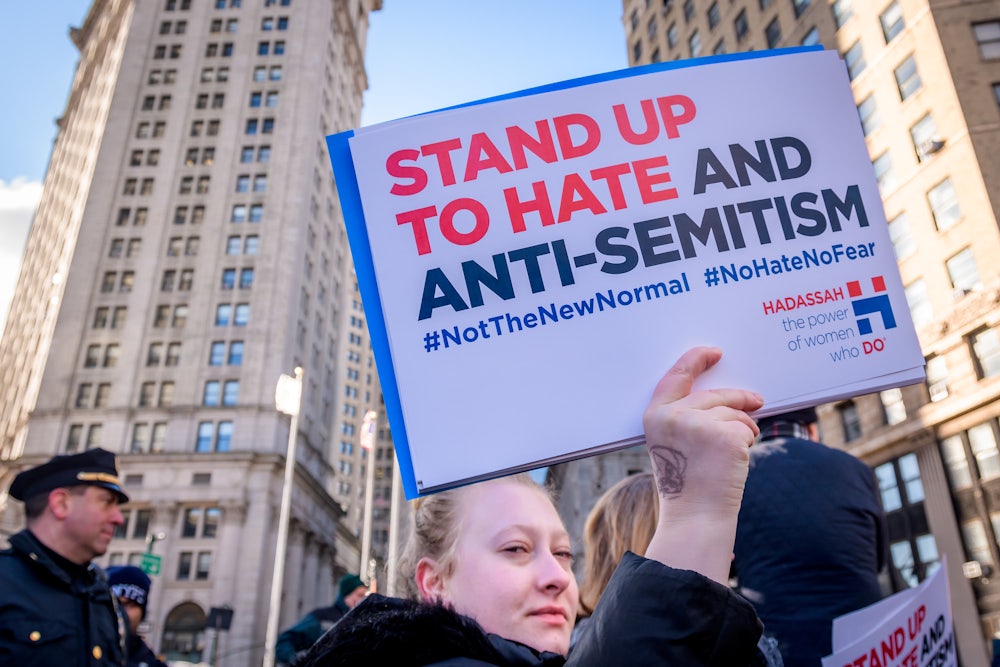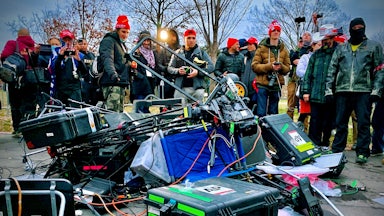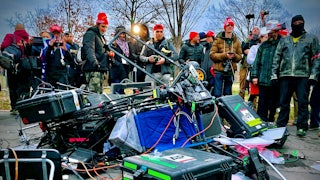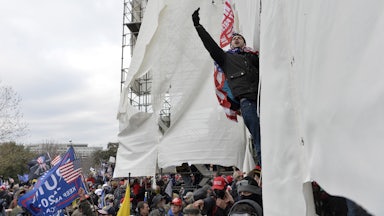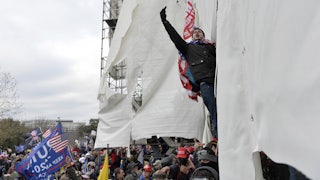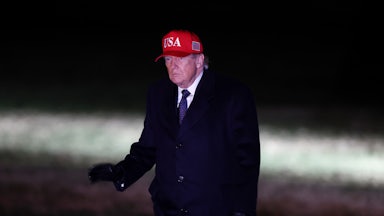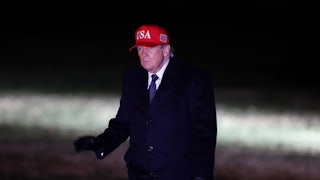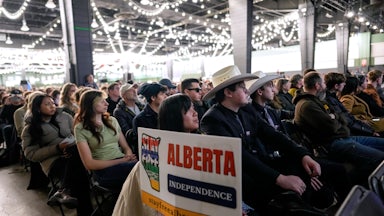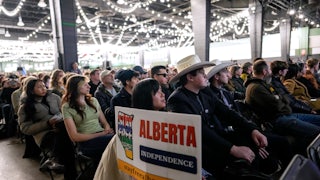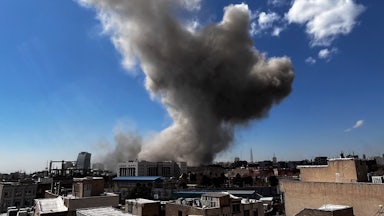Many images from the attack on the Capitol on January 6 remain burned permanently onto my mind, much like the painful halos you see in the darkness of your closed eyes after you’ve accidentally stared into a bright light. But there’s a memory that’s especially deeply seared into my brain—one that is perhaps surprising given the scenes of wanton violence that were beamed out to the world that day: The insurrectionist who showed up to the riot wearing his “Camp Auschwitz” sweatshirt. He has since been sentenced in a trial in which his sister pleaded with the court to not “judge a book by [its] cover.” An interesting assertion, considering that evidence presented in the trial revealed that underneath that hoodie, he was wearing a Nazi-themed S.S. T-shirt.
Back in January 2021, as the press sorted through the mayhem of that fateful day, the Camp Auschwitz Sweatshirt Guy ended up receiving much less media attention than say, his fellow criminal “QAnon Shaman,” in part, I believe because his Nazi stylings were less fun fodder for ironic political tweets. But I could not stop thinking about him, standing in places all over the Capitol, where a few years earlier, I also had stood, regularly, to do my job as a congressional reporter.
Not everyone who has passed through the Capitol building grew up attending Passover seders led by Auschwitz survivors, but I did. So the images of Camp Auschwitz Sweatshirt Guy, coupled with his fellow traveler, The Guy With a Confederate Flag Inside the Capitol for the First Time in Our History, have stuck with me. As a Jewish American (and sentient human being completely unbeholden to the outdated rules of “Polite D.C. society”), I saw something very clearly: White supremacy was coming out of the woodwork of the “alt-right” internet and into the spotlight of our national politics. These images, snapshots of a day that gripped a city and the nation, felt personal and urgent. They also stirred a deep pessimism in me, because I felt deeply that our current political media was not prepared to properly reckon with these facts with any degree of seriousness.
This problem, much like my pessimism, is rooted in the fact the political press, by and large, does not feel this same personal or urgent responsibility to use their considerable power to confront the rising threat of white supremacists and antisemites. They treat it as an incidental oddity instead of a growing danger; another political curiosity to be laid alongside all the others and sorted for who’s-up-and-who’s-down status.
And so we have arrived at this most recent controversy involving former President Donald Trump and his raging antisemitism, which he expressed in his typical fashion on his own (failing?) fake Twitter platform, Truth Social. To wit: American Jews “need to get their act together and appreciate what they have in Israel before it’s too late.” This was a statement so layered with unambiguous antisemitism it could be history’s most disgustingly bigoted kugel.
Trump’s words hit at the “dual loyalty” trope, in which antisemites promote the backward notion that the fealty of American Jews is permanently split between the United States and Israel, which in turn means that they can never be fully American. Trump’s contentions hit at the idea that all diasporic Jews should be concentrated in Israel. Worst of all, he gleefully hints at the extinction of the Jewish people—his “before it’s too late” threat that should be chilling to those concerned with and for American democracy.
But the reaction to Trump’s rather explicit call to antisemitism felt strangely and scarily subdued, as if it were just another unhinged Trump social media post shot into the ether, requiring just the requisite serving of “area man says crazy thing” discourse before getting shuffled off the stage to make way for the next weird outburst or the next shiny object. No one seemed to mind or care that Trump’s remarks didn’t arise in some moment of isolation, but rather were part of a wave. They came around the same time that the well-established, antisemitic rapper Kanye West complained of “Jewish Zionists” controlling the media in a TikTok post—mere days after he vowed to go “death con 3” on Jewish people. Also within that froth of bigotry was Republican gubernatorial candidate Kari Lake reciting her favored talking points, which include Democrats being “globalists who don’t care about the working people.”
The press has seemed to strain mightily to avoid making a plainspoken observation about these events, preferring instead to merely transcribe and amplify these remarks as if they were stray and unconnected threads as opposed to what they are: braided strands in a burgeoning web of hatred similar to that which nearly engulfed our democracy in 2021; a web that’s growing in stickiness and strength as we catapult into the midterm elections. We are three weeks from Election Day, and no one seems to want to acknowledge a wave of antisemitic commentary from powerful right-wing figures or who it is designed to energize.
It’s as if the media elite has learned nothing from 2016, or 2020, or even 2021. It’s all just an infinite loop of laughter and forgetting, with well-heeled political reporters breezily dismissing calls for political violence and misrule with cheerful, “Well it’s certainly interesting that this incredibly powerful person said this thing” quote tweets. It is apparently unthinkable to even consider using the adjective “dangerous” in this analysis. None seem to understand that their very profession won’t survive the designs of an entire movement that’s gearing up to deconstruct democracy, with an army of Proud Boys and Oath Keepers, a far-right anti-government militia, galvanized in support.
Naturally, the political media didn’t create this precarious political moment. And Democrats have not been strong enough in their defense of democracy: The party’s standard-bearer has come around to the notion that his opponents are, at least, “semi-fascist,” but Biden’s White House refuses to adapt to either the broken political media and its naïve both-sides tendencies, or a dysfunctional political system that treasures the Senate filibuster over passing laws to prevent voter suppression and electoral subversion.
The so-called “political establishment” and its atrophied imagination simply isn’t prepared to fight for our democracy. Two weeks prior to Trump’s remarks threatening Jews, the president of the Anti-Defamation League cast odd praise at Elon Musk by comparing him favorably to known antisemite Henry Ford, so it’s hardly surprising that he confronted Trump’s own remarks with weak-tea condemnations about how it was wrong of the former president to “Jewsplain” Israel. There is no need to confront the dangerous context of Trump’s remarks if you can just lop it off from history, precedent, or imminent danger, especially if you want to be cute with your words for social media likes.
Much has happened since Biden announced his candidacy for president, but I have not forgotten that he claimed the Nazi uprising in Charlottesville, Virginia—and Trump’s response to the violence, which claimed the life of Heather Heyer, that there were “very fine people on both sides”—provided him with the inspiration to mount a White House bid. From the vantage point of 2022, this cited raison d’être feels so hollow, it could simply be a lie. In Biden’s two biggest speeches he delivered on the challenges facing democracy—one on the one-year anniversary of the January 6 attack and then again this September in Philadelphia—he did not use the term “white supremacy” once. At a minimum the response to these threats has felt disproportionate to their actual danger.
While the White House was relatively swift to condemn Trump’s remarks as antisemitic, there was no flurry of similar sentiments from his colleagues, most of whom have striven to hold the position that Trump’s most hateful outbursts are best left undignified with a response. Unfortunately, the refusal to dignify such remarks leads the media to conclude that they are of little eminent concern and thus don’t need to be acknowledged. Democrats still don’t understand how the game is played; that the media thrives on fodder for conflict and outrage. This reticence only ensures that the media will not enter such claims into the conversation, clearing the way for the right to run endless routines from their Two Minutes Hate playbook. In a world where some of those plays are explicit sentiments of antisemitic hatred, this feels like an abdication of responsibility.
Given the timing and magnitude, the end result is the feeling that the most powerful people in this country are presenting an absurdly casual response to these invocations from the lexicon of antisemitism—from dual loyalty, to the use of the word “globalists,” to the oblique threats of extinction if American Jews don’t learn to toe the line. It is a dangerous game that both undersells the current threat to democracy while also perpetuating it. It’s a short distance between “Camp Auschwitz” sweatshirts and MAGA hats (which is true both literally and metaphorically, as we’ve seen these items together in photos). These shared beliefs are not subtle, so our pushback to normalizing antisemitism should be equally forceful.
I grew up in an America where I knew being Jewish made me different but it was a difference I was unafraid to celebrate. In this country, I could enjoy holiday dinners with relatives who survived the unthinkable. As recently as my childhood, I had little reason to believe that being born into my religious traditions threatened my rights as an American citizen. I hoped and imagined—not unreasonably, I think—that threats of literal extinction for Jews who found their way to America were behind us; that the credo of “never again” would mean something, especially to those in Washington, D.C.
I fear that our children, and specifically my son, will not enjoy that same privilege. And it’s not lost on me that this is the entire point of this concerted, unchecked effort from the right and its Republican enablers: to stoke fear among marginalized Americans of all walks of life and to create the political infrastructure to entrench hatred in a way that legitimately threatens lives. And so I find myself wondering who out there—on Twitter, in office, hiding anonymously in a crowd—will find the opportunity to make us afraid absolutely irresistible. But I also wonder who will accommodate the hate and the fear, who will ignore it, who will forgive, and who will forget it.
